Unit 4 I used to be afraid of the dark Section B(1a-2f)课件+音频(共74张PPT)九年级全册英语教学同步精美课件(人教版)
文档属性
| 名称 | Unit 4 I used to be afraid of the dark Section B(1a-2f)课件+音频(共74张PPT)九年级全册英语教学同步精美课件(人教版) |
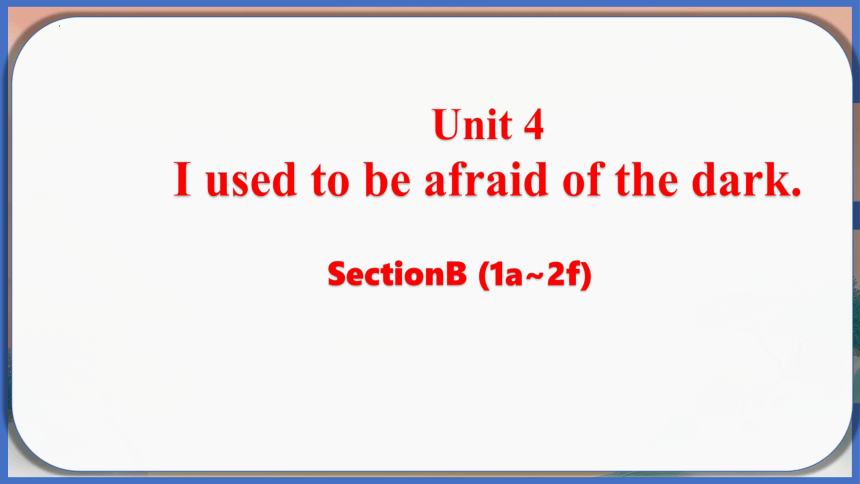
|
|
| 格式 | pptx | ||
| 文件大小 | 25.4MB | ||
| 资源类型 | 教案 | ||
| 版本资源 | 人教新目标(Go for it)版 | ||
| 科目 | 英语 | ||
| 更新时间 | 2025-07-07 00:00:00 | ||
图片预览

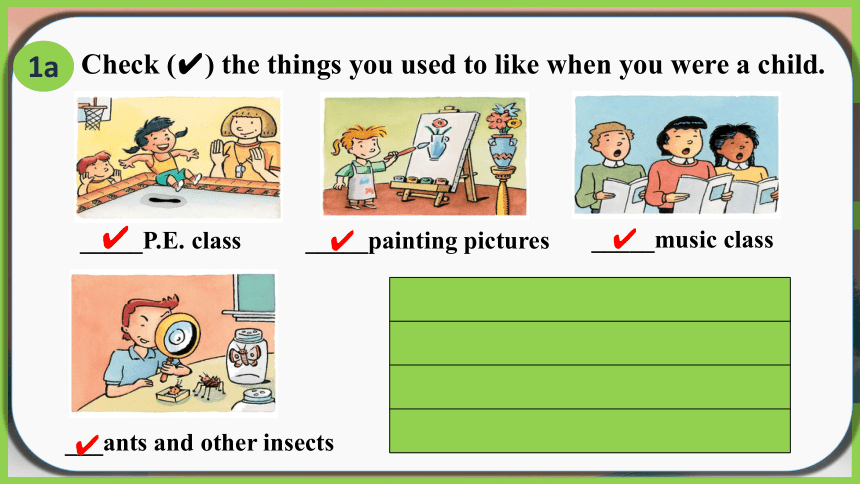
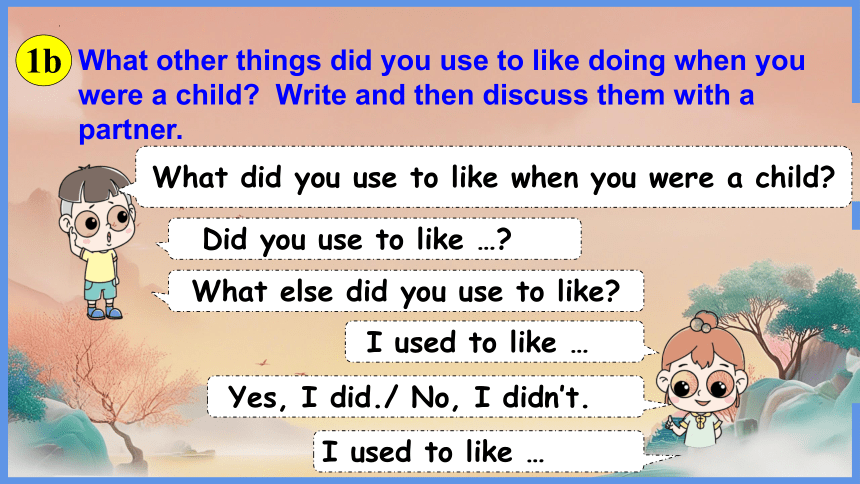
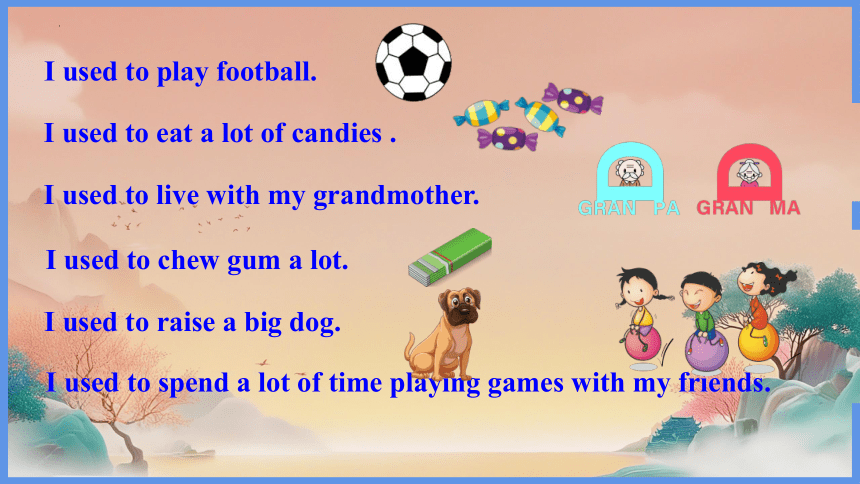
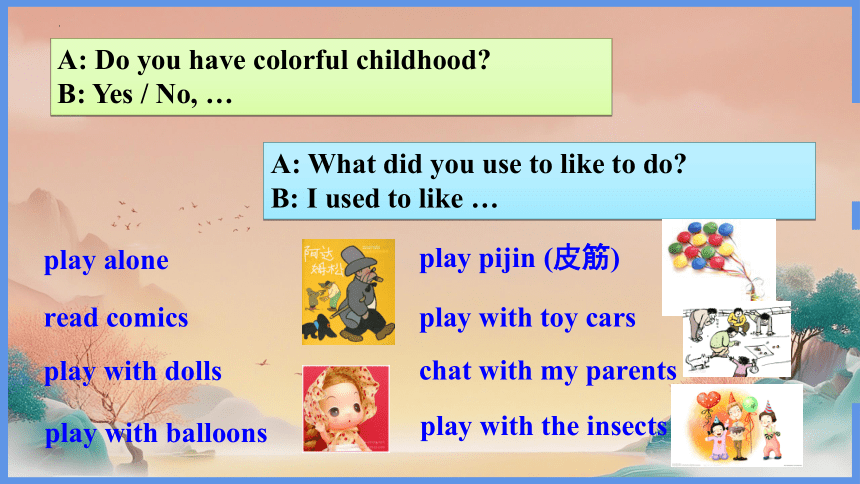
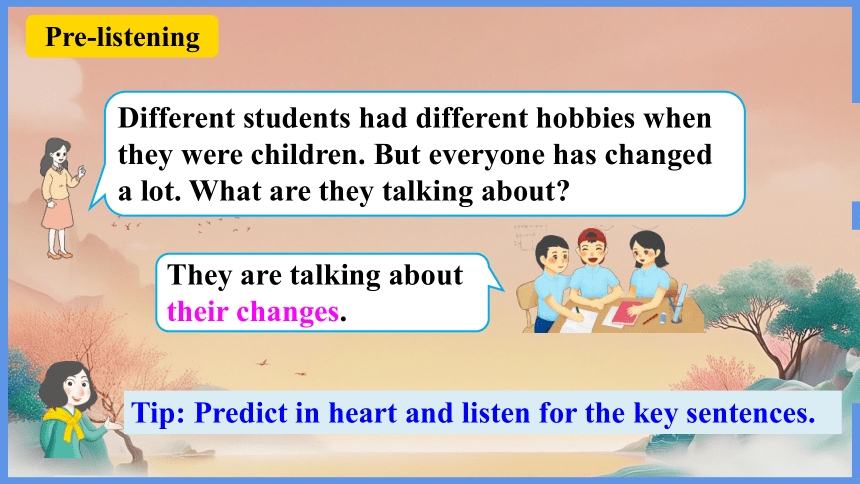
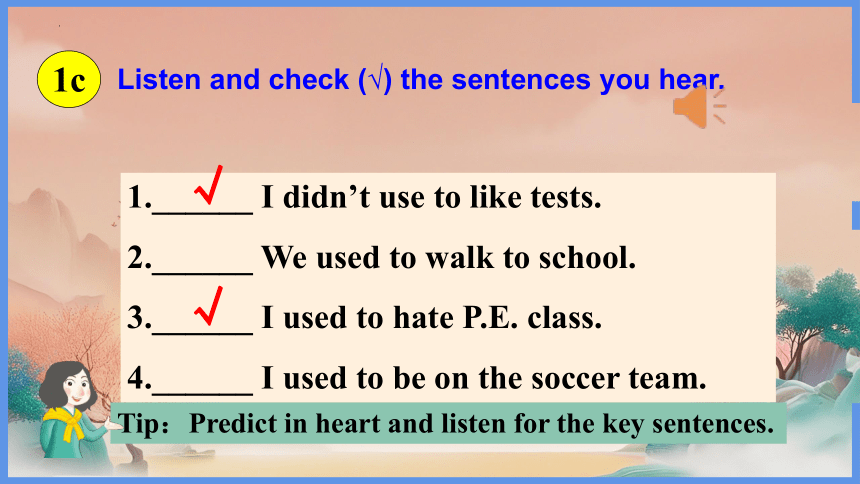
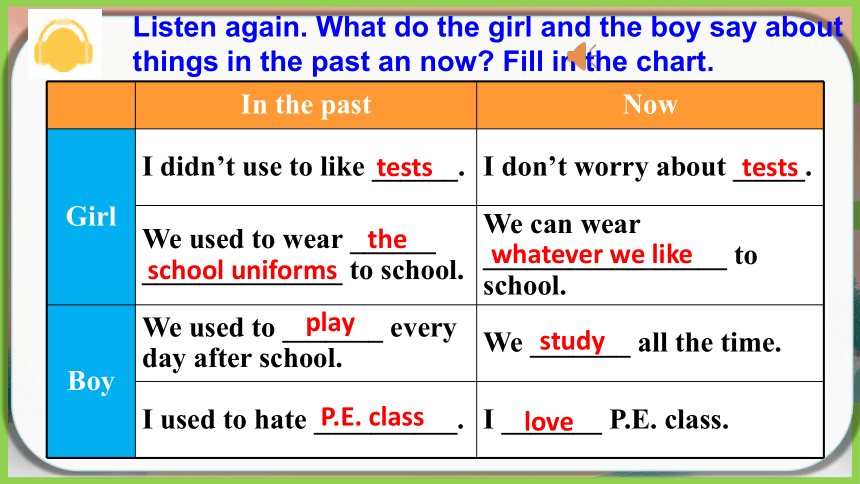
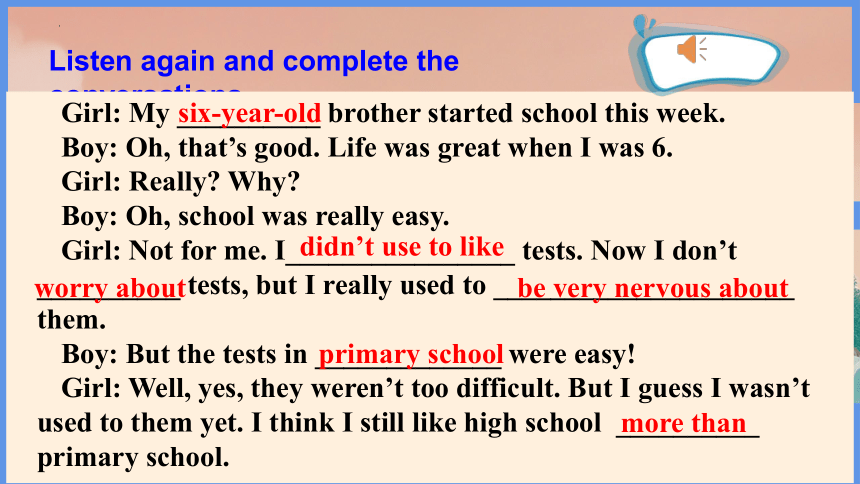
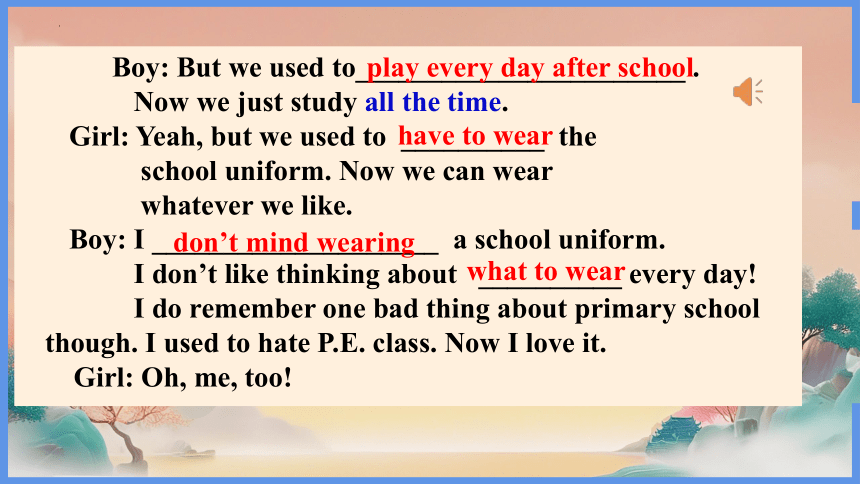
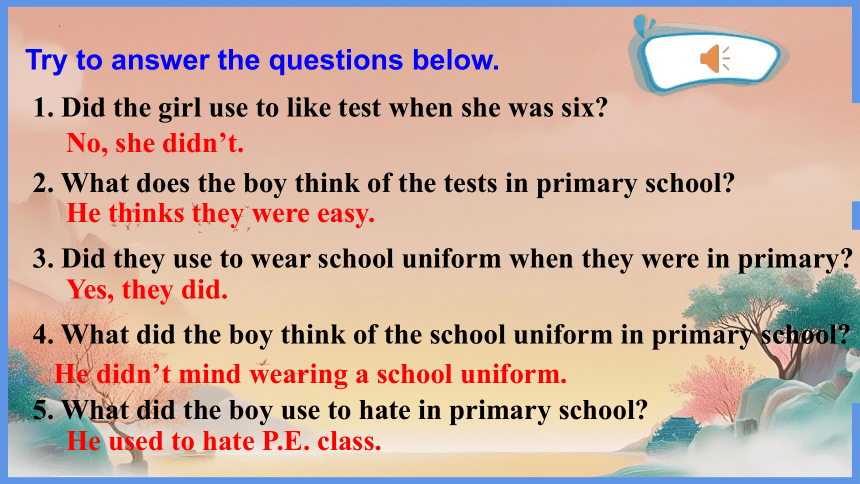

文档简介
(共74张PPT)
Unit 4
I used to be afraid of the dark.
SectionB (1a~2f)
Check ( ) the things you used to like when you were a child.
_____music class
_____P.E. class
_____painting pictures
___ants and other insects
1a
What other things did you use to like doing when you were a child Write and then discuss them with a partner.
1b
I used to like …
What did you use to like when you were a child
Did you use to like …
Yes, I did./ No, I didn’t.
What else did you use to like
I used to like …
I used to play football.
I used to eat a lot of candies .
I used to live with my grandmother.
I used to chew gum a lot.
I used to raise a big dog.
I used to spend a lot of time playing games with my friends.
read comics
play with dolls
play with balloons
play pijin (皮筋)
play with toy cars
chat with my parents
play with the insects
play alone
A: What did you use to like to do
B: I used to like …
A: Do you have colorful childhood
B: Yes / No, …
Different students had different hobbies when they were children. But everyone has changed a lot. What are they talking about
They are talking about their changes.
Tip: Predict in heart and listen for the key sentences.
Pre-listening
______ I didn’t use to like tests.
______ We used to walk to school.
______ I used to hate P.E. class.
______ I used to be on the soccer team.
√
√
Listen and check (√) the sentences you hear.
1c
Tip:Predict in heart and listen for the key sentences.
In the past Now
Girl I didn’t use to like ______. I don’t worry about _____.
We used to wear ______ ______________ to school. We can wear _________________ to school.
Boy We used to _______ every day after school. We _______ all the time.
I used to hate __________. I _______ P.E. class.
tests
tests
play
study
P.E. class
love
school uniforms
whatever we like
the
Listen again. What do the girl and the boy say about things in the past an now Fill in the chart.
Listen again and complete the conversations.
Girl: My __________ brother started school this week.
Boy: Oh, that’s good. Life was great when I was 6.
Girl: Really Why
Boy: Oh, school was really easy.
Girl: Not for me. I________________ tests. Now I don’t __________ tests, but I really used to _____________________ them.
Boy: But the tests in _____________ were easy!
Girl: Well, yes, they weren’t too difficult. But I guess I wasn’t used to them yet. I think I still like high school __________ primary school.
six-year-old
didn’t use to like
worry about
be very nervous about
primary school
more than
Boy: But we used to_______________________ .
Now we just study all the time.
Girl: Yeah, but we used to __________ the
school uniform. Now we can wear
whatever we like.
Boy: I ____________________ a school uniform.
I don’t like thinking about __________ every day!
I do remember one bad thing about primary school though. I used to hate P.E. class. Now I love it.
Girl: Oh, me, too!
play every day after school
have to wear
don’t mind wearing
what to wear
1. Did the girl use to like test when she was six
2. What does the boy think of the tests in primary school
3. Did they use to wear school uniform when they were in primary
4. What did the boy think of the school uniform in primary school
5. What did the boy use to hate in primary school
No, she didn’t.
He thinks they were easy.
Yes, they did.
He didn’t mind wearing a school uniform.
He used to hate P.E. class.
Try to answer the questions below.
Read and check.
Girl: My six-year-old brother started school this week.
Boy: Oh, that’s good. Life was great when I was six.
Girl: Really Why
Boy: Oh, school was really easy.
Girl: Not for me. I didn’t use to like tests. Now I don’t
worry about tests, but I really used to be very
nervous about them.
Boy: But the tests in primary school were easy!
Girl: Well, yes, they weren’t too difficult. But I guess
I wasn’t used to them yet. I think I still like high
school more than primary school.
Boy: But we used to play every day after school. Now
we just study all the time.
Girl: Yeah, but we used to have to wear the school
uniform. Now we can wear whatever we like.
Boy: I don’t mind wearing a school uniform. I don’t
like thinking about what to wear every day! I do
remember one bad thing about primary school
though. I used to hate P.E. class. Now I love it.
Girl: Oh, me, too!
听力原文
be used to (doing) sth.
习惯于……
used to + 动词原形
过去习惯性的动作或存在的状态
Listen, imitate and read. Pay attention to the pronunciation, stress and intonation.
1. Read the conversation aloud for a few minutes by yourself.
2. Role-play the conversation.
Compare yourself with your partner.
I used to be nervous about tests all the time. What about you
Yes, me too. And I used to be afraid of giving a speech in public.
I used to hate P. E. class. What about you
Well, I used to walk to school.
I used to ride my bike to school. What about you
I used to hate P. E. class, too. But now I love it.
I used to ... What about you
Well, I used to ...
I used to ... What about you
I used to ... But now I ...
have P.E. class
paint pictures
wear the school uniform
have music class
play every day after school
be nervous about tests
上体育课
画画
穿校服
上音乐课
每天放学后玩
考试紧张
主语+ used to +动词原形 …
1. 肯定句式:
2. 否定句式:
主语+ didn't use to/used not to +动词原形 …
3. 疑问句式:
Did+主语+use to+动词原形+其它?
Used+主语+to+动词原形+其它?
4. 反义疑问句:
主语+used to do sth,+did/didn’t +主语
主语+used to do sth,+used/ usedn’t+主语?
1.worry about对……担心; 忧虑
worry about sb. /sth. 意为“为某人/某事而焦虑、烦恼、担心, 担心某人/某事”。
Language points
I don’t worry about tests. 我不担心考试。
Don’t worry about Tom. He’ll be back soon.
不必为汤姆担忧。他马上就回来。
拓展:worry的常见三种用法
(1)worry可作及物动词, 意为“使烦恼, 使焦虑”, 常接sb. 作宾语。
什么事使你这么担心 What worried you so much
(2)worry也可作不及物动词, 意为“烦恼; 担心”, 后常跟介词about。
老师经常担心我们的安全。
Our teacher often worries about our safety.
(3)worry后接从句时, 也表示“为……担心”。
这位老师担心此次考试对她的学生来说可能太难了些。
The teacher worried that the exam might be too difficult for her students.
【学以致用】
①Don’t________ (担心). We can get there on time.
②Don’t________ _______ (担心)your daughter. She is old enough.
③—How is Helen in the new school
—She is doing very well. There is nothing to worry______.
A. about B. of C. with D. /
worry
worry about
2.all the time一直; 总是
worry about sb. /sth. 意为“为某人/某事而焦虑、烦恼、担心, 担心某人/某事”。
【妙辨异同】always与all the time
两者都可意为“总是, 一直”, 但其用法有所不同。具体用法见下表:
always 侧重于频率, 表示周期性的规律, 含有“每逢……都是”的意思 通常位于实义动词之前, 助动词或连系动词之后
all the time 侧重于一段时间内连续的动作, 或时间上的不间断, 表示始终如一、没有停止 通常位于句末
【学以致用】
①她总是很忙。She is busy_____________.
②晚饭后他总是去散步。
He_________ takes a walk after dinner.
③ He _______ gets up early every morning.
A. all the time B. all time
C. always
all the time
always
辨析:at times / at all times / all the time
at times 不时; 偶尔
I make mistakes at times when I speak English.我说英语偶尔会出错。
at all times 随时; 任何时候; 总是
He has a cool head at all times. 他随时都有清醒的头脑。
all the time 一直; 始终 (time用单数形式)
The baby cries all the time.那婴儿一直哭。
【学以致用】
It’s rather cold in most of South China ______ in spring.
A. on time B. at a time
C. at times D. all the time
3.be nervous about意为“对……感到紧张”,about 为介词,后接名词、代词或动词的-ing形式作宾语。
There is nothing to be nervous about.没什么可紧张的。
辨析: nervous 和 anxious
nervous:在事情发展的过程中有一种怕的感觉=rather afraid
anxious: 由于害怕某种事情会发生而感到焦急、担心 =worried
I’m always nervous when I have to make a speech.
在必须演讲时我总感到紧张。
Your mother will be anxious until she hears you’re safe.
你妈妈只有在听到你安然无恙时才会放下心来。
用所给单词的适当形式填空。
paint, walk, do, on, have to
1.My brother used to ______ to school, but now he drives his car.
2. My bike was broken. I ____________ walk to school yesterday.
3. The boy likes _______________ pictures very much.
4. Jim hates _____ homework, so he doesn’t do well in his study.
5. You play baseball well. Are you _______ the baseball team
doing
on
walk
had to
painting/to paint
1. There are so many _______ (蚂蚁) here. I think it's going to rain.
2. Ants, bees and butterflies are all ________.
3. 我昨天考试很紧张。
I _______ _________ _______ the exam yesterday.
4. Alex曾经在足球队。
Alex _______ _______ _______ _______ the soccer team.
根据语境或汉语提示填空。
ants
insects
used to be on
was nervous about
翻译下列句子。
5. 你过去经常和朋友去河里游泳吗?
_________ you ____ _____ swim in the river with
6. 我小时候每天放学后都和朋友一起玩耍。
I used to _______ _______ friends every day after school.
7. 过去这儿冬天常常下雪。
It _______ _______ _______ here in winter.
8. 他在担心明天的工作面试。
He is _______ _______ the job interview of tomorrow.
9. 当你是孩子时,常常做些什么?
What ______ you _______ _______ do when you were a child
Did use to
play with
used to snow
worried about
did use to
In the past, did you use to do something not very good And do you do it better now Think about some changes in your life and write down your own sentences.
Past Now
I used to forget my mom’s birthday. I kiss my mom and say “I love you” on her birthday.
I used to spit in the street. I become a volunteer in an environment group.
…… ……
…… ……
Writing
Li Wen is a 15-year-old boy from the countryside. His parents are working in the city. Look at the title of the passage and the picture below. What problems do you think he might have
Before reading
Prediction
Li Wen
He is a left-behind child.
the picture
(Reading tip : The title and the picture in the passage can help you predict what you will read about.)
miss his parents
feel lonely
have no interest
in studying
Title: He Studies Harder than He Used to
now
in the past
Now he studies harder.
He didn’t use to study hard.
change
How
While reading
Fast reading
Read the passage quickly and match
each paragraph with its main idea.
Reading tip :
Pay attention to the first sentence or the last
sentence to get the main idea.
1.The problems Li Wen used to cause.
2.A long talk changed Li Wen.
3.Li Wen changed to be better.
4.The introduction to Li Wen.
Para. 1
Para. 2
Para. 3
Para. 4
C
D
A
B
Read the passage and put the sentences [A–D] in the correct places.
They had a long talk
Now Li Wen has really changed
However, things began to change a few years ago
His teacher was worried about him
A.
B.
C.
D.
Missing language
Li Wen is a normal 15-year-old boy from the countryside. He works very hard and does well in school. It is hard to believe that he used to have difficulties in school. When he was a little boy, he seldom caused any problems, and his family spent a lot of time together.
. His parents moved to the city to look for jobs, and his grandparents came to take care of him. But he missed his parents so much and he often felt lonely and unhappy.
However, things began to change a few years ago
C.
C
转折关系 however/but …
Li Wen’s unhappiness began to influence his schoolwork. He became less interested in studying. Sometimes he was absent from classes and failed his examinations. Finally, Li Wen’s parents made the decision to send him to a boarding school. However, Li Wen was shy and was not able to make friends quickly in school. He found life there difficult. One day he told his teacher that he wanted to leave the school. and she called his parents. She advised them to talk with their son in person.
His teacher was worried about him
D.
关注上下文的关系及代词
D
. “It was exactly what I needed,” he said. “Now I understand that even though they are busy, they are always thinking of me. They take pride in everything good that I do.”
She advised them to talk with their son in person. So his parents took a 24-hour train and a 5-hour bus ride to get to Li Wen’s school.
They had a long talk
A.
关注上下文的关系及代词
A
After that, Li Wen’s parents had much more communication with their son than they used to. . He became more outgoing and made some good friends in school. He even joined the school basketball team and became active in many other activities. “I’m much happier now, and I work even harder than I used to. I know my parents love me and they’re always proud of me,” says Li Wen. “It’s very important for parents to be there for their children.”
Now Li Wen has really changed
B.
关注上下文的关系及同义词
B
While reading
Careful reading
Task 1
C. However, things began to change a few years ago.
Li Wen used to have difficulties in school.
His parents left him behind and he felt very lonely and unhappy.
He didn’t like his parents.
He worked very hard and did well in school after his grandparents came to look after him.
He missed his parents so much and wanted to live with them.
Read para1 carefully and finish the tasks.
T
T
F
F
missed
became less interested in studying
T
Reading tip 4:
Finding out the key words may help you find out the answers quickly.
Why did Li Wen became less interested in studying
He is a lazy boy.
B. He wants to play.
C. He felt lonely and unhappy.
D. He doesn’t like to study.
Let’s read.
Read para. 2 and choose.
2. Which of the following is NOT Li Wen’s difficulties in school
He was absent from classes.
B. He failed his examinations.
C. He was shy.
D. He was able to make friends easily in school.
3. His parents took a _____ and a ______ ride to get to Li’s school.
24 hour bus, 5 hour train
B. 24-hour train, 5-hour bus
C. 24-hour's train, 5-hour's bus
D. 24-hour bus, 15-hour train
While reading
Careful reading
Task 2
D. His teacher was worried about him
Read Para2 carefully and answer the questions.
1. How did his unhappiness influenced his schoolwork
2.Did Li Wen like the boarding school How do you know
3.What did his teacher do when he wanted to leave
4. How did his parents get to his school
He became less interested in studying . He was
absent from class and faied the examinations.
No. He wasn't able to make friends
and he wanted to leave school.
She called his parents and advise
them to talk with him in person.
They took a 24-hour train and a 5-hour bus.
对比李文的父母外出找工作前后李文的行为和思想表现;下文“他变得对学习不感兴趣、逃课、考试不及格”等情况的出现, 可知是李文不高兴的情绪“影响”了他的学业。
influence: have an effect on; change 影响
上文 “…he was absent from classes and failed his examinations和Li Wen’s parents made the decision”可知其父母送其去了一所寄宿制学校。boarding school: a school that a student can stay in, i.e. he / she does not need to go home every day
由上下文“他对学习不再感兴趣”、 “他考试不及格”, 关键词classes, 可推测 “他经常缺课”, absent: not present; missing from 缺席, 不在
下文“His parents took a 24-hour train and a 5-hour bus ride to get to Li Wen’s school.”, 可知其父母费如此大的周折赶回家来, 是因为老师的建议“亲自和他们的儿子进行交谈”。
in person: face to face 亲自地
Li Wen is the main character of today’s story.
He is a left-behind child.
What problems did he use to have
While reading
Careful reading
Task 3
What does “it” refer(指代) to
2. What did Li Wen understand after the talk
Read Para3 carefully and answer the questions.
Read Para4 carefully and fill in the chart below.
Past Now
He felt ________ and ________. He is _____________ now, because
he knows his parents
_________________.
He used to_____________ classes and _______ his examinations. He works ___________
than he used to.
He was _____ and was not be able to ____________ quickly in school. He becomes ________________ and
____________________________
in school.
lonely
unhappy
be absent from
failed
shy
make friends
much happier
are proud of him
even harder
more outgoing
makes some good friends
A. They had a long talk.
The talk between him and his parents
Even though they busy, they are always thinking of me. They take pride in everything good that I do.
B
Let’s read.
Read paragraph 4 and finish the bubble diagram (气泡图).
Changes
Emotion
Study
Personality
Li Wen has changed in many ways. What are they
In the past:
Now:
In the past:
Now:
He felt lonely and unhappy.
He was much happier now.
In the past:
Now:
He was shy and was not be able to make friends quickly in school.
He became more outgoing and make some good friends in school.
He was absent from classes and failed his examinations.
He worked even harder than he used to.
While reading
Careful reading
Task 4
Read the passage again and answer the questions.
Why did Li Wen cause a lot of trouble
2. What made him change a lot
3. According to Li Wen, what is the most
important thing in children’s lives
4. Do you agree with him Why
Because his parents moved to the city to look for jobs. He
missed his parents so much and he often felt lonely and unhappy.
C
D
B
A. They had a long talk.
A long talk between Li Wen and his parents.
The most important thing for children is that their parents can
always be there for them.
Yes, I agree with him. Children are not old enough to deal with many things alone. They need the company of parents. They need support, help and care from their parents. “It’s important for parents to be there for their children.”
After reading
3. Retell the passage according to the struture of the article.
Discussion
Watch a video and think about the questions.
What do children really need during their growing up
much money
beautiful clothes
delicious snacks
expensive I phones
love and care
company(陪伴)
communication
√
√
√
Parents
Children
Parents are always there for their children.
Children should also love and understand
their parents.
What problems do left-behind children have
Let’s think.
Some of them lack love.
They couldn’t often see their parents.
Some may easily be involved in criminal activities (参与犯罪活动).
If you are left-behind children, what can you learn from the article
Let’s think.
Ask the teacher if there are any problems.
Communicate with our parents more.
Make more friends to deal with loneliness.
What can we do to help left-behind children
Let’s think.
Writer letters to comfort and encourage them.
Send them some interesting books and magazines.
Go to visit them.
Mom and dad, I miss you so much.
We miss you, too.
Dear, why do you want to leave school
Because I feel …
…
2f. Write a conversation between Li Wen and his parents, and role-play it with your group. Try to use the sentences in the passage.
Let’s think.
4. What do you think Li Wen and his parents talked about in their conversation Write a conversation and role-play it with your group. Think of the following things:
Possible questions Li Wen might ask his parents
Questions his parents might ask Li Wen
Possible answers from Li Wen and his parents
After reading
2f
Li Wen: Do you love me
Mother: Of, course we do.
Li Wen: Why don’t you come home to see me more often
Father: Sorry, we are really busy with our jobs every day. Life is not easy and there are more chances in big cities.
Mother: But we do miss you every day. Every time we think of you, we will work harder…
Mother: …We want to get you a better education and then, of course, a good future.
Father: In our eyes, you are a hardworking and kind child. And we are always proud of you.
Mother: But what happened to you, dear It seems that you have a bad performance at school. Why have your grades dropped recently Is there anything unhappy that influences you
Li Wen: Um … I think it is because I always feel lonely. I miss you so much.
Father: That is our fault. What should we do in your opinion
Li Wen: I think what we need isn’t too much money or other material wealth. We need more
communication and love from each other.
Father: We agree with you, Li Wen. It’s very important for parents to be there for their children.
Mother: That’s what I want to say. We’ve heard that you want to leave the school. Why
Li Wen: I don’t have any friends and there are many strict rules in school.
Mother: I see. I understand that you think life is hard …
Father: I think you can be brave and try to be more active. How about playing basketball with other
boys I know you are good at playing basketball.
Li Wen: Ok. I’ll have a try.
Mother: We are always proud of you, son.
Li Wen: But please don’t worry too much about me. I will study harder. I believe things will be better
soon.
Father: We both hope that you’ll become more and more cheerful and positive. Remember we take
pride in everything good that you do. We love you son.
Li Wen: I love you, too. Thank you, Dad and Mom.
1.Parents should often spend time with their children and communicate more with them.
2.When their children have problems, they should give them some advice.
3.Parents should know what their children exactly need.
4.Parents should give their children warmth and encouragement. They should also take pride in their children.
How do you understand the following sentence
What should parents do for their children
Discussion
It’s very important for parents to be there for their children.
What should we do for our parents
1. We should understand our parents.
2. We should be independent and take good care of ourselves.
3.We should ask for help actively,when we have problems.
Saying
Parents and children are best gifts given to
each other.
Parents’ love for their children is far-reaching.
(父母之爱子,则为之计深远。)
Understanding is the foundation of love.
Complete the passage with the proper forms of the words and phrases in the box.
2. Complete the passage with the proper forms of the words and phrases in the box.
be proud of / take pride in make a decision/ decide miss / be absent from
change / influence look after / take care of
Li Wen is a 15-year-old boy. He works hard and does well in school. It is hard to believe that he used to have difficulties in school. When his parents moved to the city to work, they could not be at home to ___________________ him. So he became less interested in studying and _____________________ classes. Then his parents __________________ to send him to a boarding school. He found life there difficult. One day he told his teacher he wanted to leave the school. His teacher advised his parents to talk with their son in person. This conversation _____________________ his life.He realized that his parents would always love him, and they would ______________________ everything good that he did. Now he is much happier and more outgoing than he used to be.
look after/ take care of
missed/ was absent from
be proud of/ take pride in
decided/made a decision
changed / influenced
2e
After reading
Tell your love to your parents! 爱要大声说出来!
Dear mum and dad,
I’m happy to write the letter to you. In the past, I thought you
me, and it really my study. So I used to
classes and .But now I know you
my life and study. You love me. You’re too busy to
me. In the future, I’ll than I used to. I’ll
achieve my dreams and let you me.
I love you forever.
Yours,
Li Wen
take pride in
(be proud of)
not love
influence
fail examinations
be absent from
care about
work harder
try one’s best
exactly
take care of
(look after)
didn’t love
influenced
be absent from
fail examinations
exactly
care about
work harder
try my best to
take pride in
/ be proud of
take care of
/ look after
After reading
Writing
04
Language
points
1.Li Wen is a normal 15-year-old boy … 李文是一个普通的15岁的男孩……
改写句子
1.Mike is outgoing,he is 8 years old.___________________________________
2.Alice is humorous, she is 16 years old._________________________________
Mike is an outgoing 8-year-old boy .
Alice is a humorous 19-year-old girl .
2. When he was a little boy, he seldom caused any problems...
当他还是个小男孩时, 他很少惹麻烦...
seldom adv.(频度副词) “不常;很少”
位置: (be动词/助动词/情态动词之后; 实意动词之前)
Language points
注意:
seldom是表示否定意义的词, 当句中出现seldom时, 该句子为否定句,
类似的词还有:no, none, no one, nothing, nobody, never, hardly(几乎不), few(少量的[修饰可数名词复数]), little(少量的[修饰不可数名词]) 等
e.g. (填空, 完成下列的反意疑问句)
He seldom goes to see the film, _____ ____
He is never late for school, _____ ____
does
he
is
he
3.Li Wen's unhappiness began to influence his schoolwork.
李文的不快乐开始影响他的学业。
influence v. & n. “影响”
influence sb. to do sth. “影响某人使其做某事”
influence可用作名词, 常用于have / has an influence on ... 或be an influence on ... 结构。
【运用】1. 老师对学生有很大的影响。
Teachers __________ a great _____________ students.
2. 受父母的影响,李梅成为了一名医生。Li Mei’s parents __________ her ________ a doctor.
3. 谁对你的人生有重大影响?Who ____________________________ on your life
have / are
influence on
influenced
to be
has / is an important influence
4. Sometimes he was absent from classes and failed his examinations.
be absent from ... be absent from classes “旷课; 缺课”
absent adj. ① → absence n. ② → (反义词) present“出席的; 到场的”
3) fail v. “失败” 短语: fail (in) sth./fail to do sth.
→ failure n. “失败”
e.g. Failure is the mother of success.
【运用】1.翻译: 好学生是不会逃课的。____________________________________
2. 填空。
1) The car failed _______ at the red light. (stop)
2) Sandy was sad because she failed ___ business.
A good student would not be absent from school.
in
to stop
proud与pride的异同
proud adj, 意为“自豪的; 骄傲的”。
be proud of意为“以……为自豪”,
pride n, 意为“自豪; 骄傲”。
take pride in意为“以……为自豪”
【中考链接】完成句子,每空词数不限。
刘翔虽然告别了他心爱的跨栏,但我们依然以他为骄傲。
Liu Xiang said goodbye to his loved hurdle, but we are _____ __ him. ( 四川自贡)
(2) 上周参观了博物馆后,我为中国的发明感到自豪。
I ______________ Chinese inventions after visiting the museum last week. (take) (湖北黄冈)
proud of
took pride in
05
Summary
do well in school
cause problems
move to the city
look for jobs
take care of sb.
miss his parents
feel lonely and unhappy
influence his schoolwork
be absent from classes
在学校表现好
制造麻烦
搬到城市
找工作
照顾某人
想念他的父母
感到孤独和不开心
影响他的学业
缺课;缺勤
将某人送到一所寄宿学校
他的考试不及格
决定做某事
交朋友
离开学校
建议某人做某事
亲身;亲自
乘坐24个小时的火车
即使;虽然
想起某人
send sb. to a boarding school
fail his examinations
make the decision to do sth.
make friends
leave the school
advise sb. to do sth.
in person
take a 24-hour train ride
even though
think of sb.
句型:
1. It is hard to believe that he used to have difficulties in school.
2. He became less interested in studying.
have a long talk
take pride in/be proud of
become active in many other activities
长谈
为……骄傲; 为……感到自豪
在许多别的活动中变得积极
Let’s check.
评价内容 1 2 3 4 5
能够结合上下文猜测词语意思,理解文章。
能了解留守儿童这一社会现象,并积极为他们提供帮助。
通过学习本文,能学会和父母交流,加强相互理解。
06
Exercise
I. 根据句意, 从方框中选择恰当的单词填空, 注意形式变化。
exam, seldom, influence, exactly
1. Lu Xun’s novels have __________ many people.
2. No one knows _________ what time the fire started.
3. Lisa isn’t good at sports, so she ________ does sports in her free time.
4. Her problem is that she feels nervous before big ____________ and can’t sleep well.
examinations
influenced
exactly
seldom
II. 根据句意及所给汉语提示,写出所缺内容,每空一词(含缩略形式)。
1. She made the birthday cake for me _______ _______ (亲自).
2. Tina has been at the _________ _________(寄宿学校) for two months.
3. As we know, a true friend _______ _______ _______ _______ _______(总是不离我们左右).
4. I went to see the doctor this morning. He ________ _______ _______ _______ ________ _______(建议我不要吃肉).
5. Bill and his friends are going to take _______ ___________ _________________(两周的假期) in China.
us
in person
boarding school
is always there for
not to eat/have meat
advised me
holiday/vacation
a two-week
III. 根据上句完成下句, 使两句意思相同或相近, 每空一词(含缩略形式)。
1. A few students missed the first class because of the heavy rain.
A few students _______ _______ _______ the first class because of the heavy rain.
2. Three boy students failed the chemistry test.
Three boy students _______ _______ the chemistry test.
3. My mother looked after my grandparents at home.
My mother _______ _______ _______ my grandparents at home.
took care of
were absent from
didn’t pass
4. Mr. White has decided to buy the house near the beach.
Mr. White _______ _______ _______ ________ to buy the house near the beach.
5. Miss Li went on working even if she was sick.
Miss Li went on working _______ _______ she was sick.
6. As Chinese, we are proud of our great country.
As Chinese, we _______ _______ _______ our great country.
take pride in
has made a/the decision
even though
Work in groups and make a poster to call on people to care about stay-at-home children.
Unit 4
I used to be afraid of the dark.
SectionB (1a~2f)
Check ( ) the things you used to like when you were a child.
_____music class
_____P.E. class
_____painting pictures
___ants and other insects
1a
What other things did you use to like doing when you were a child Write and then discuss them with a partner.
1b
I used to like …
What did you use to like when you were a child
Did you use to like …
Yes, I did./ No, I didn’t.
What else did you use to like
I used to like …
I used to play football.
I used to eat a lot of candies .
I used to live with my grandmother.
I used to chew gum a lot.
I used to raise a big dog.
I used to spend a lot of time playing games with my friends.
read comics
play with dolls
play with balloons
play pijin (皮筋)
play with toy cars
chat with my parents
play with the insects
play alone
A: What did you use to like to do
B: I used to like …
A: Do you have colorful childhood
B: Yes / No, …
Different students had different hobbies when they were children. But everyone has changed a lot. What are they talking about
They are talking about their changes.
Tip: Predict in heart and listen for the key sentences.
Pre-listening
______ I didn’t use to like tests.
______ We used to walk to school.
______ I used to hate P.E. class.
______ I used to be on the soccer team.
√
√
Listen and check (√) the sentences you hear.
1c
Tip:Predict in heart and listen for the key sentences.
In the past Now
Girl I didn’t use to like ______. I don’t worry about _____.
We used to wear ______ ______________ to school. We can wear _________________ to school.
Boy We used to _______ every day after school. We _______ all the time.
I used to hate __________. I _______ P.E. class.
tests
tests
play
study
P.E. class
love
school uniforms
whatever we like
the
Listen again. What do the girl and the boy say about things in the past an now Fill in the chart.
Listen again and complete the conversations.
Girl: My __________ brother started school this week.
Boy: Oh, that’s good. Life was great when I was 6.
Girl: Really Why
Boy: Oh, school was really easy.
Girl: Not for me. I________________ tests. Now I don’t __________ tests, but I really used to _____________________ them.
Boy: But the tests in _____________ were easy!
Girl: Well, yes, they weren’t too difficult. But I guess I wasn’t used to them yet. I think I still like high school __________ primary school.
six-year-old
didn’t use to like
worry about
be very nervous about
primary school
more than
Boy: But we used to_______________________ .
Now we just study all the time.
Girl: Yeah, but we used to __________ the
school uniform. Now we can wear
whatever we like.
Boy: I ____________________ a school uniform.
I don’t like thinking about __________ every day!
I do remember one bad thing about primary school though. I used to hate P.E. class. Now I love it.
Girl: Oh, me, too!
play every day after school
have to wear
don’t mind wearing
what to wear
1. Did the girl use to like test when she was six
2. What does the boy think of the tests in primary school
3. Did they use to wear school uniform when they were in primary
4. What did the boy think of the school uniform in primary school
5. What did the boy use to hate in primary school
No, she didn’t.
He thinks they were easy.
Yes, they did.
He didn’t mind wearing a school uniform.
He used to hate P.E. class.
Try to answer the questions below.
Read and check.
Girl: My six-year-old brother started school this week.
Boy: Oh, that’s good. Life was great when I was six.
Girl: Really Why
Boy: Oh, school was really easy.
Girl: Not for me. I didn’t use to like tests. Now I don’t
worry about tests, but I really used to be very
nervous about them.
Boy: But the tests in primary school were easy!
Girl: Well, yes, they weren’t too difficult. But I guess
I wasn’t used to them yet. I think I still like high
school more than primary school.
Boy: But we used to play every day after school. Now
we just study all the time.
Girl: Yeah, but we used to have to wear the school
uniform. Now we can wear whatever we like.
Boy: I don’t mind wearing a school uniform. I don’t
like thinking about what to wear every day! I do
remember one bad thing about primary school
though. I used to hate P.E. class. Now I love it.
Girl: Oh, me, too!
听力原文
be used to (doing) sth.
习惯于……
used to + 动词原形
过去习惯性的动作或存在的状态
Listen, imitate and read. Pay attention to the pronunciation, stress and intonation.
1. Read the conversation aloud for a few minutes by yourself.
2. Role-play the conversation.
Compare yourself with your partner.
I used to be nervous about tests all the time. What about you
Yes, me too. And I used to be afraid of giving a speech in public.
I used to hate P. E. class. What about you
Well, I used to walk to school.
I used to ride my bike to school. What about you
I used to hate P. E. class, too. But now I love it.
I used to ... What about you
Well, I used to ...
I used to ... What about you
I used to ... But now I ...
have P.E. class
paint pictures
wear the school uniform
have music class
play every day after school
be nervous about tests
上体育课
画画
穿校服
上音乐课
每天放学后玩
考试紧张
主语+ used to +动词原形 …
1. 肯定句式:
2. 否定句式:
主语+ didn't use to/used not to +动词原形 …
3. 疑问句式:
Did+主语+use to+动词原形+其它?
Used+主语+to+动词原形+其它?
4. 反义疑问句:
主语+used to do sth,+did/didn’t +主语
主语+used to do sth,+used/ usedn’t+主语?
1.worry about对……担心; 忧虑
worry about sb. /sth. 意为“为某人/某事而焦虑、烦恼、担心, 担心某人/某事”。
Language points
I don’t worry about tests. 我不担心考试。
Don’t worry about Tom. He’ll be back soon.
不必为汤姆担忧。他马上就回来。
拓展:worry的常见三种用法
(1)worry可作及物动词, 意为“使烦恼, 使焦虑”, 常接sb. 作宾语。
什么事使你这么担心 What worried you so much
(2)worry也可作不及物动词, 意为“烦恼; 担心”, 后常跟介词about。
老师经常担心我们的安全。
Our teacher often worries about our safety.
(3)worry后接从句时, 也表示“为……担心”。
这位老师担心此次考试对她的学生来说可能太难了些。
The teacher worried that the exam might be too difficult for her students.
【学以致用】
①Don’t________ (担心). We can get there on time.
②Don’t________ _______ (担心)your daughter. She is old enough.
③—How is Helen in the new school
—She is doing very well. There is nothing to worry______.
A. about B. of C. with D. /
worry
worry about
2.all the time一直; 总是
worry about sb. /sth. 意为“为某人/某事而焦虑、烦恼、担心, 担心某人/某事”。
【妙辨异同】always与all the time
两者都可意为“总是, 一直”, 但其用法有所不同。具体用法见下表:
always 侧重于频率, 表示周期性的规律, 含有“每逢……都是”的意思 通常位于实义动词之前, 助动词或连系动词之后
all the time 侧重于一段时间内连续的动作, 或时间上的不间断, 表示始终如一、没有停止 通常位于句末
【学以致用】
①她总是很忙。She is busy_____________.
②晚饭后他总是去散步。
He_________ takes a walk after dinner.
③ He _______ gets up early every morning.
A. all the time B. all time
C. always
all the time
always
辨析:at times / at all times / all the time
at times 不时; 偶尔
I make mistakes at times when I speak English.我说英语偶尔会出错。
at all times 随时; 任何时候; 总是
He has a cool head at all times. 他随时都有清醒的头脑。
all the time 一直; 始终 (time用单数形式)
The baby cries all the time.那婴儿一直哭。
【学以致用】
It’s rather cold in most of South China ______ in spring.
A. on time B. at a time
C. at times D. all the time
3.be nervous about意为“对……感到紧张”,about 为介词,后接名词、代词或动词的-ing形式作宾语。
There is nothing to be nervous about.没什么可紧张的。
辨析: nervous 和 anxious
nervous:在事情发展的过程中有一种怕的感觉=rather afraid
anxious: 由于害怕某种事情会发生而感到焦急、担心 =worried
I’m always nervous when I have to make a speech.
在必须演讲时我总感到紧张。
Your mother will be anxious until she hears you’re safe.
你妈妈只有在听到你安然无恙时才会放下心来。
用所给单词的适当形式填空。
paint, walk, do, on, have to
1.My brother used to ______ to school, but now he drives his car.
2. My bike was broken. I ____________ walk to school yesterday.
3. The boy likes _______________ pictures very much.
4. Jim hates _____ homework, so he doesn’t do well in his study.
5. You play baseball well. Are you _______ the baseball team
doing
on
walk
had to
painting/to paint
1. There are so many _______ (蚂蚁) here. I think it's going to rain.
2. Ants, bees and butterflies are all ________.
3. 我昨天考试很紧张。
I _______ _________ _______ the exam yesterday.
4. Alex曾经在足球队。
Alex _______ _______ _______ _______ the soccer team.
根据语境或汉语提示填空。
ants
insects
used to be on
was nervous about
翻译下列句子。
5. 你过去经常和朋友去河里游泳吗?
_________ you ____ _____ swim in the river with
6. 我小时候每天放学后都和朋友一起玩耍。
I used to _______ _______ friends every day after school.
7. 过去这儿冬天常常下雪。
It _______ _______ _______ here in winter.
8. 他在担心明天的工作面试。
He is _______ _______ the job interview of tomorrow.
9. 当你是孩子时,常常做些什么?
What ______ you _______ _______ do when you were a child
Did use to
play with
used to snow
worried about
did use to
In the past, did you use to do something not very good And do you do it better now Think about some changes in your life and write down your own sentences.
Past Now
I used to forget my mom’s birthday. I kiss my mom and say “I love you” on her birthday.
I used to spit in the street. I become a volunteer in an environment group.
…… ……
…… ……
Writing
Li Wen is a 15-year-old boy from the countryside. His parents are working in the city. Look at the title of the passage and the picture below. What problems do you think he might have
Before reading
Prediction
Li Wen
He is a left-behind child.
the picture
(Reading tip : The title and the picture in the passage can help you predict what you will read about.)
miss his parents
feel lonely
have no interest
in studying
Title: He Studies Harder than He Used to
now
in the past
Now he studies harder.
He didn’t use to study hard.
change
How
While reading
Fast reading
Read the passage quickly and match
each paragraph with its main idea.
Reading tip :
Pay attention to the first sentence or the last
sentence to get the main idea.
1.The problems Li Wen used to cause.
2.A long talk changed Li Wen.
3.Li Wen changed to be better.
4.The introduction to Li Wen.
Para. 1
Para. 2
Para. 3
Para. 4
C
D
A
B
Read the passage and put the sentences [A–D] in the correct places.
They had a long talk
Now Li Wen has really changed
However, things began to change a few years ago
His teacher was worried about him
A.
B.
C.
D.
Missing language
Li Wen is a normal 15-year-old boy from the countryside. He works very hard and does well in school. It is hard to believe that he used to have difficulties in school. When he was a little boy, he seldom caused any problems, and his family spent a lot of time together.
. His parents moved to the city to look for jobs, and his grandparents came to take care of him. But he missed his parents so much and he often felt lonely and unhappy.
However, things began to change a few years ago
C.
C
转折关系 however/but …
Li Wen’s unhappiness began to influence his schoolwork. He became less interested in studying. Sometimes he was absent from classes and failed his examinations. Finally, Li Wen’s parents made the decision to send him to a boarding school. However, Li Wen was shy and was not able to make friends quickly in school. He found life there difficult. One day he told his teacher that he wanted to leave the school. and she called his parents. She advised them to talk with their son in person.
His teacher was worried about him
D.
关注上下文的关系及代词
D
. “It was exactly what I needed,” he said. “Now I understand that even though they are busy, they are always thinking of me. They take pride in everything good that I do.”
She advised them to talk with their son in person. So his parents took a 24-hour train and a 5-hour bus ride to get to Li Wen’s school.
They had a long talk
A.
关注上下文的关系及代词
A
After that, Li Wen’s parents had much more communication with their son than they used to. . He became more outgoing and made some good friends in school. He even joined the school basketball team and became active in many other activities. “I’m much happier now, and I work even harder than I used to. I know my parents love me and they’re always proud of me,” says Li Wen. “It’s very important for parents to be there for their children.”
Now Li Wen has really changed
B.
关注上下文的关系及同义词
B
While reading
Careful reading
Task 1
C. However, things began to change a few years ago.
Li Wen used to have difficulties in school.
His parents left him behind and he felt very lonely and unhappy.
He didn’t like his parents.
He worked very hard and did well in school after his grandparents came to look after him.
He missed his parents so much and wanted to live with them.
Read para1 carefully and finish the tasks.
T
T
F
F
missed
became less interested in studying
T
Reading tip 4:
Finding out the key words may help you find out the answers quickly.
Why did Li Wen became less interested in studying
He is a lazy boy.
B. He wants to play.
C. He felt lonely and unhappy.
D. He doesn’t like to study.
Let’s read.
Read para. 2 and choose.
2. Which of the following is NOT Li Wen’s difficulties in school
He was absent from classes.
B. He failed his examinations.
C. He was shy.
D. He was able to make friends easily in school.
3. His parents took a _____ and a ______ ride to get to Li’s school.
24 hour bus, 5 hour train
B. 24-hour train, 5-hour bus
C. 24-hour's train, 5-hour's bus
D. 24-hour bus, 15-hour train
While reading
Careful reading
Task 2
D. His teacher was worried about him
Read Para2 carefully and answer the questions.
1. How did his unhappiness influenced his schoolwork
2.Did Li Wen like the boarding school How do you know
3.What did his teacher do when he wanted to leave
4. How did his parents get to his school
He became less interested in studying . He was
absent from class and faied the examinations.
No. He wasn't able to make friends
and he wanted to leave school.
She called his parents and advise
them to talk with him in person.
They took a 24-hour train and a 5-hour bus.
对比李文的父母外出找工作前后李文的行为和思想表现;下文“他变得对学习不感兴趣、逃课、考试不及格”等情况的出现, 可知是李文不高兴的情绪“影响”了他的学业。
influence: have an effect on; change 影响
上文 “…he was absent from classes and failed his examinations和Li Wen’s parents made the decision”可知其父母送其去了一所寄宿制学校。boarding school: a school that a student can stay in, i.e. he / she does not need to go home every day
由上下文“他对学习不再感兴趣”、 “他考试不及格”, 关键词classes, 可推测 “他经常缺课”, absent: not present; missing from 缺席, 不在
下文“His parents took a 24-hour train and a 5-hour bus ride to get to Li Wen’s school.”, 可知其父母费如此大的周折赶回家来, 是因为老师的建议“亲自和他们的儿子进行交谈”。
in person: face to face 亲自地
Li Wen is the main character of today’s story.
He is a left-behind child.
What problems did he use to have
While reading
Careful reading
Task 3
What does “it” refer(指代) to
2. What did Li Wen understand after the talk
Read Para3 carefully and answer the questions.
Read Para4 carefully and fill in the chart below.
Past Now
He felt ________ and ________. He is _____________ now, because
he knows his parents
_________________.
He used to_____________ classes and _______ his examinations. He works ___________
than he used to.
He was _____ and was not be able to ____________ quickly in school. He becomes ________________ and
____________________________
in school.
lonely
unhappy
be absent from
failed
shy
make friends
much happier
are proud of him
even harder
more outgoing
makes some good friends
A. They had a long talk.
The talk between him and his parents
Even though they busy, they are always thinking of me. They take pride in everything good that I do.
B
Let’s read.
Read paragraph 4 and finish the bubble diagram (气泡图).
Changes
Emotion
Study
Personality
Li Wen has changed in many ways. What are they
In the past:
Now:
In the past:
Now:
He felt lonely and unhappy.
He was much happier now.
In the past:
Now:
He was shy and was not be able to make friends quickly in school.
He became more outgoing and make some good friends in school.
He was absent from classes and failed his examinations.
He worked even harder than he used to.
While reading
Careful reading
Task 4
Read the passage again and answer the questions.
Why did Li Wen cause a lot of trouble
2. What made him change a lot
3. According to Li Wen, what is the most
important thing in children’s lives
4. Do you agree with him Why
Because his parents moved to the city to look for jobs. He
missed his parents so much and he often felt lonely and unhappy.
C
D
B
A. They had a long talk.
A long talk between Li Wen and his parents.
The most important thing for children is that their parents can
always be there for them.
Yes, I agree with him. Children are not old enough to deal with many things alone. They need the company of parents. They need support, help and care from their parents. “It’s important for parents to be there for their children.”
After reading
3. Retell the passage according to the struture of the article.
Discussion
Watch a video and think about the questions.
What do children really need during their growing up
much money
beautiful clothes
delicious snacks
expensive I phones
love and care
company(陪伴)
communication
√
√
√
Parents
Children
Parents are always there for their children.
Children should also love and understand
their parents.
What problems do left-behind children have
Let’s think.
Some of them lack love.
They couldn’t often see their parents.
Some may easily be involved in criminal activities (参与犯罪活动).
If you are left-behind children, what can you learn from the article
Let’s think.
Ask the teacher if there are any problems.
Communicate with our parents more.
Make more friends to deal with loneliness.
What can we do to help left-behind children
Let’s think.
Writer letters to comfort and encourage them.
Send them some interesting books and magazines.
Go to visit them.
Mom and dad, I miss you so much.
We miss you, too.
Dear, why do you want to leave school
Because I feel …
…
2f. Write a conversation between Li Wen and his parents, and role-play it with your group. Try to use the sentences in the passage.
Let’s think.
4. What do you think Li Wen and his parents talked about in their conversation Write a conversation and role-play it with your group. Think of the following things:
Possible questions Li Wen might ask his parents
Questions his parents might ask Li Wen
Possible answers from Li Wen and his parents
After reading
2f
Li Wen: Do you love me
Mother: Of, course we do.
Li Wen: Why don’t you come home to see me more often
Father: Sorry, we are really busy with our jobs every day. Life is not easy and there are more chances in big cities.
Mother: But we do miss you every day. Every time we think of you, we will work harder…
Mother: …We want to get you a better education and then, of course, a good future.
Father: In our eyes, you are a hardworking and kind child. And we are always proud of you.
Mother: But what happened to you, dear It seems that you have a bad performance at school. Why have your grades dropped recently Is there anything unhappy that influences you
Li Wen: Um … I think it is because I always feel lonely. I miss you so much.
Father: That is our fault. What should we do in your opinion
Li Wen: I think what we need isn’t too much money or other material wealth. We need more
communication and love from each other.
Father: We agree with you, Li Wen. It’s very important for parents to be there for their children.
Mother: That’s what I want to say. We’ve heard that you want to leave the school. Why
Li Wen: I don’t have any friends and there are many strict rules in school.
Mother: I see. I understand that you think life is hard …
Father: I think you can be brave and try to be more active. How about playing basketball with other
boys I know you are good at playing basketball.
Li Wen: Ok. I’ll have a try.
Mother: We are always proud of you, son.
Li Wen: But please don’t worry too much about me. I will study harder. I believe things will be better
soon.
Father: We both hope that you’ll become more and more cheerful and positive. Remember we take
pride in everything good that you do. We love you son.
Li Wen: I love you, too. Thank you, Dad and Mom.
1.Parents should often spend time with their children and communicate more with them.
2.When their children have problems, they should give them some advice.
3.Parents should know what their children exactly need.
4.Parents should give their children warmth and encouragement. They should also take pride in their children.
How do you understand the following sentence
What should parents do for their children
Discussion
It’s very important for parents to be there for their children.
What should we do for our parents
1. We should understand our parents.
2. We should be independent and take good care of ourselves.
3.We should ask for help actively,when we have problems.
Saying
Parents and children are best gifts given to
each other.
Parents’ love for their children is far-reaching.
(父母之爱子,则为之计深远。)
Understanding is the foundation of love.
Complete the passage with the proper forms of the words and phrases in the box.
2. Complete the passage with the proper forms of the words and phrases in the box.
be proud of / take pride in make a decision/ decide miss / be absent from
change / influence look after / take care of
Li Wen is a 15-year-old boy. He works hard and does well in school. It is hard to believe that he used to have difficulties in school. When his parents moved to the city to work, they could not be at home to ___________________ him. So he became less interested in studying and _____________________ classes. Then his parents __________________ to send him to a boarding school. He found life there difficult. One day he told his teacher he wanted to leave the school. His teacher advised his parents to talk with their son in person. This conversation _____________________ his life.He realized that his parents would always love him, and they would ______________________ everything good that he did. Now he is much happier and more outgoing than he used to be.
look after/ take care of
missed/ was absent from
be proud of/ take pride in
decided/made a decision
changed / influenced
2e
After reading
Tell your love to your parents! 爱要大声说出来!
Dear mum and dad,
I’m happy to write the letter to you. In the past, I thought you
me, and it really my study. So I used to
classes and .But now I know you
my life and study. You love me. You’re too busy to
me. In the future, I’ll than I used to. I’ll
achieve my dreams and let you me.
I love you forever.
Yours,
Li Wen
take pride in
(be proud of)
not love
influence
fail examinations
be absent from
care about
work harder
try one’s best
exactly
take care of
(look after)
didn’t love
influenced
be absent from
fail examinations
exactly
care about
work harder
try my best to
take pride in
/ be proud of
take care of
/ look after
After reading
Writing
04
Language
points
1.Li Wen is a normal 15-year-old boy … 李文是一个普通的15岁的男孩……
改写句子
1.Mike is outgoing,he is 8 years old.___________________________________
2.Alice is humorous, she is 16 years old._________________________________
Mike is an outgoing 8-year-old boy .
Alice is a humorous 19-year-old girl .
2. When he was a little boy, he seldom caused any problems...
当他还是个小男孩时, 他很少惹麻烦...
seldom adv.(频度副词) “不常;很少”
位置: (be动词/助动词/情态动词之后; 实意动词之前)
Language points
注意:
seldom是表示否定意义的词, 当句中出现seldom时, 该句子为否定句,
类似的词还有:no, none, no one, nothing, nobody, never, hardly(几乎不), few(少量的[修饰可数名词复数]), little(少量的[修饰不可数名词]) 等
e.g. (填空, 完成下列的反意疑问句)
He seldom goes to see the film, _____ ____
He is never late for school, _____ ____
does
he
is
he
3.Li Wen's unhappiness began to influence his schoolwork.
李文的不快乐开始影响他的学业。
influence v. & n. “影响”
influence sb. to do sth. “影响某人使其做某事”
influence可用作名词, 常用于have / has an influence on ... 或be an influence on ... 结构。
【运用】1. 老师对学生有很大的影响。
Teachers __________ a great _____________ students.
2. 受父母的影响,李梅成为了一名医生。Li Mei’s parents __________ her ________ a doctor.
3. 谁对你的人生有重大影响?Who ____________________________ on your life
have / are
influence on
influenced
to be
has / is an important influence
4. Sometimes he was absent from classes and failed his examinations.
be absent from ... be absent from classes “旷课; 缺课”
absent adj. ① → absence n. ② → (反义词) present“出席的; 到场的”
3) fail v. “失败” 短语: fail (in) sth./fail to do sth.
→ failure n. “失败”
e.g. Failure is the mother of success.
【运用】1.翻译: 好学生是不会逃课的。____________________________________
2. 填空。
1) The car failed _______ at the red light. (stop)
2) Sandy was sad because she failed ___ business.
A good student would not be absent from school.
in
to stop
proud与pride的异同
proud adj, 意为“自豪的; 骄傲的”。
be proud of意为“以……为自豪”,
pride n, 意为“自豪; 骄傲”。
take pride in意为“以……为自豪”
【中考链接】完成句子,每空词数不限。
刘翔虽然告别了他心爱的跨栏,但我们依然以他为骄傲。
Liu Xiang said goodbye to his loved hurdle, but we are _____ __ him. ( 四川自贡)
(2) 上周参观了博物馆后,我为中国的发明感到自豪。
I ______________ Chinese inventions after visiting the museum last week. (take) (湖北黄冈)
proud of
took pride in
05
Summary
do well in school
cause problems
move to the city
look for jobs
take care of sb.
miss his parents
feel lonely and unhappy
influence his schoolwork
be absent from classes
在学校表现好
制造麻烦
搬到城市
找工作
照顾某人
想念他的父母
感到孤独和不开心
影响他的学业
缺课;缺勤
将某人送到一所寄宿学校
他的考试不及格
决定做某事
交朋友
离开学校
建议某人做某事
亲身;亲自
乘坐24个小时的火车
即使;虽然
想起某人
send sb. to a boarding school
fail his examinations
make the decision to do sth.
make friends
leave the school
advise sb. to do sth.
in person
take a 24-hour train ride
even though
think of sb.
句型:
1. It is hard to believe that he used to have difficulties in school.
2. He became less interested in studying.
have a long talk
take pride in/be proud of
become active in many other activities
长谈
为……骄傲; 为……感到自豪
在许多别的活动中变得积极
Let’s check.
评价内容 1 2 3 4 5
能够结合上下文猜测词语意思,理解文章。
能了解留守儿童这一社会现象,并积极为他们提供帮助。
通过学习本文,能学会和父母交流,加强相互理解。
06
Exercise
I. 根据句意, 从方框中选择恰当的单词填空, 注意形式变化。
exam, seldom, influence, exactly
1. Lu Xun’s novels have __________ many people.
2. No one knows _________ what time the fire started.
3. Lisa isn’t good at sports, so she ________ does sports in her free time.
4. Her problem is that she feels nervous before big ____________ and can’t sleep well.
examinations
influenced
exactly
seldom
II. 根据句意及所给汉语提示,写出所缺内容,每空一词(含缩略形式)。
1. She made the birthday cake for me _______ _______ (亲自).
2. Tina has been at the _________ _________(寄宿学校) for two months.
3. As we know, a true friend _______ _______ _______ _______ _______(总是不离我们左右).
4. I went to see the doctor this morning. He ________ _______ _______ _______ ________ _______(建议我不要吃肉).
5. Bill and his friends are going to take _______ ___________ _________________(两周的假期) in China.
us
in person
boarding school
is always there for
not to eat/have meat
advised me
holiday/vacation
a two-week
III. 根据上句完成下句, 使两句意思相同或相近, 每空一词(含缩略形式)。
1. A few students missed the first class because of the heavy rain.
A few students _______ _______ _______ the first class because of the heavy rain.
2. Three boy students failed the chemistry test.
Three boy students _______ _______ the chemistry test.
3. My mother looked after my grandparents at home.
My mother _______ _______ _______ my grandparents at home.
took care of
were absent from
didn’t pass
4. Mr. White has decided to buy the house near the beach.
Mr. White _______ _______ _______ ________ to buy the house near the beach.
5. Miss Li went on working even if she was sick.
Miss Li went on working _______ _______ she was sick.
6. As Chinese, we are proud of our great country.
As Chinese, we _______ _______ _______ our great country.
take pride in
has made a/the decision
even though
Work in groups and make a poster to call on people to care about stay-at-home children.
同课章节目录
- Unit 1 How can we become good learners.
- Section A
- Section B
- Unit 2 I think that mooncakes are delicious!
- Section A
- Section B
- Unit 3 Could you please tell me where the restroom
- Section A
- Section B
- Unit 4 I used to be afraid of the dark.
- Section A
- Section B
- Unit 5 What are the shirts made of?
- Section A
- Section B
- Review of Units 1-5
- Unit 6 When was it invented?
- Section A
- Section B
- Unit 7 Teenagers should be allowed to choose their
- Section A
- Section B
- Unit 8 It must belong to Carla.
- Section A
- Section B
- Unit 9 I like music that I can dance to.
- Section A
- Section B
- Unit 10 You're supposed to shake hands.
- Section A
- Section B
- Review of Units 6-10
- Unit 11 Sad movies make me cry.
- Section A
- Section B
- Unit 12 Life is full of the unexpected
- Section A
- Section B
- Unit 13 We're trying to save the earth!
- Section A
- Section B
- Unit 14 I remember meeting all of you in Grade 7.
- Section A
- Section B
- Review of Units 11-14
